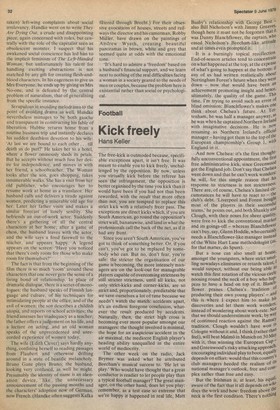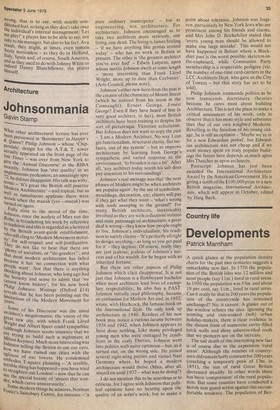Football
Kick freely
Hans Keller
The free-kick is outmoded because, specifiable exceptions apart, it isn't free. It was meant to enable you to kick freely, unchallenged by the opposition. By now, unless you virtually kick before the referee has seen the infringement, the opposition is better organised by the time you kick than it would have been if you had not thus been rewarded, with the result that more often than not, you are tempted to replace this strict kick with a relatively freer pass. The exceptions are direct kicks which, if you are South American, go round the opposition's strict wall, bananawise, and land in what the professionals call the back of the net, as if it had any front.
Since you aren't South American, you've got to think of something better. Or, if you can't, you've got to be replaced by somebody who can. But no, don't fear, you're safe: the stricter the organisation of our game is becoming, the more intensely managers are on the look-out for manageable players capable of overcoming strictness by still stricter strictness, until all kicks, not only strict-kicks and corner-kicks, are so strict and, proportionately, predictable that we save ourselves a lot of time because we needn't watch the match: accidents apart, it's an endless foregone conclusion, whatever the result produced by accidents. Naturally, then, the strict high cross is becoming ever more popular amongst our managers: the thought involved is minimal, the hope for an auspicious accident in the air maximal, the mediocre English player's heading ability unequalled in the entire world of mediocrity.
The other week on the radio, Jack Brymer was asked what he attributed Beecham's musical success to. 'He let us play.' Who would have thought that a great conductor is readier to let people play than a typical football manager? The great manager, on the other hand, does let you play: remember, as a test case so extreme that we're happy it happened in real life, Matt Busby's relationship with George Best also Bill Nicholson's with Jimmy Greaves., though here it must not be forgotten that it was Danny Blanchflower, the captain, who eased Nicholson's Beecham-like attitude and at times even prompted it.
It is a burningly topical recollection. End-of-season articles tend to concentrate on what happened at the top, at the expense of what's going to happen at the bottom: if any of us had written realistically about Nottingham Forest's future when they were down now that would have been an achievement promoting insight and hence, ultimately, the quality of the game. This time, I'm trying to avoid such an error of blind omission: Blanchflower's makes one think about Chelsea's future. At Tottenham, he was half a manager anyway, as he was when he captained Northern Ireland with imaginative decisions. He is now resuming as Northern Ireland's official manager having got them to the top of th,e European championship's Group 1, wItn England in it.
And now Chelsea: it's the first thoughtfully unconventional appointment, the first free administrative kick, since GreenwOrl got the England job. Don't say that Chelsea went down and that he can't work wonders.: he will, for this simple reason that his response to strictness is not stricterness. There are, of course, Chelsea's limited or" cumstances he will have to react to the club's debt. 'Liverpool and Forest bougui most of the players in their successful teams,' he points out, and both Shankly and dough, with their noses for sheer qualitY, were free to kick the conventional market and its goings-off whereas Blanchflower can't buy, say, Glenn Hoddle, who certainlY needs a Blanchflower-like manager instead of the White Hart Lane methodologist (as, for that matter, do Spurs).
But a nose can also smell at home, amongst the youngsters, where strict snnelling nowadays eliminates or retards talent, would suspect, without our being able t° watch this first rotation of the vicious circle noosing round the neck of a boy who har pens to have a head on top of it. Blanch; flower praises Chelsea's 'tradition °I producing their own young players' and this is where I expect him to make his discoveries and let them work wonders, instead of wondering about work-rate. I`In„t that we should underestimate work, by waY of continued reaction against the Rainsq tradition. Clough wouldn't have won In Cologne without it and, I think (rather that' feel), will beat Malmo in Munich on 30 MO with it, thus winning the European Cup and Greenwood's risky attacking approach, encouraging individual play to boot, equall,Y depends on effort: would that this count s club managers heeded the realism of Its national manager's outlook, free and coinplex rather than free and easy. But the Irishman is, at least, his egtol' aware of the fact that it all depends on wil° does the work and how: freedom above the neck is the first condition. There's nothing v?'ong, that is to say, with strictly conditioned feet, so long as they don't take over the individual's internal management: 'Let me play!' a player has to be able to say, not only to his manager, but also to his feet. Asa result, they might, at times, even remain freely motionless — as they do in Holland, Italy, Spain and, of course, South America, and as they used to do with Johnny White or indeed Danny Blanchflower, the player himself.











































 Previous page
Previous page